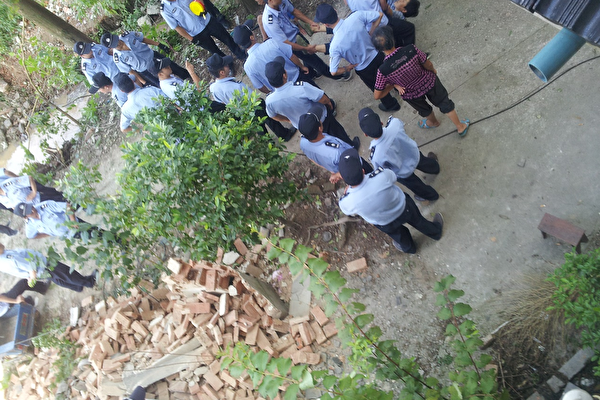The Chinese Communist Party’s public security system plans to convert some auxiliary police officers into regular civil servants within the next two years to alleviate the pressure of maintaining stability and to streamline the discipline of grassroots police force structure. Many experts believe that this move is a significant signal by the authorities in response to potential social risks, attempting to strengthen the national control system, but it may ultimately lead to bloating of the system and increased internal resource consumption.
According to sources familiar with the matter, this plan is spearheaded by the Ministry of Public Security and will be implemented in phases with the goal of completing the reclassification and conversion of the national auxiliary police force by 2027.
The source informed reporters that the current number of auxiliary police officers is substantial, with public security bureaus across the country widely recruiting auxiliary police officers at low salaries. However, due to low compensation, lax management, and low loyalty, it has become increasingly challenging to meet the political demand of the Chinese Communist Party’s central objective of “stability overriding everything.” “Currently, the salary of auxiliary police officers is less than half of regular police officers, even lower in the northeastern three provinces, yet they undertake a significant amount of high-risk tasks. With high turnover and low enthusiasm, incidents are easily provoked.”
Public reports have shown that Shanghai completed the pilot conversion of the first 5,000 auxiliary police officers in the fourth quarter of 2024. According to data from the Ministry of Public Security, by the end of 2024, the total number of auxiliary police officers nationwide exceeded 1.2 million, accounting for 46% of frontline police forces.
Guo Min, a former police officer from Hunan now residing in the United States, commented that the conversion of auxiliary police officers to regular police officers is not based on fairness but reflects political necessity. “The authorities require reliable and controllable grassroots forces. Many auxiliary police officers have connections to senior public security officials or local government officials. This conversion is also a personnel reshuffle, which I have experienced during my time as a police officer.”
He added that despite most auxiliary police officers graduating from police schools and receiving systematic training, limited official positions and lack of personal connections severely restrict their chances of conversion. Some areas have even experienced the phenomenon of “auxiliary police officers competing internally,” leading to management chaos and lax discipline. “In some regions, there have been incidents of auxiliary police officers protesting for unpaid wages, raising concerns among senior officials.”
In addition to the stability needs, financial considerations within the Chinese Communist Party are also a major obstacle to the conversion reform. Li Anping, a human rights lawyer from Guangdong, told reporters that local governments face financial constraints and incorporating millions of off-the-books employees into regular positions will inevitably create significant financial pressure. “Salaries, insurance, pension contributions all need to be increased, but local finances can hardly sustain this. In the end, they may only be able to ‘convert some, stabilize some.'”
Li Anping also mentioned that in some regions, monthly salaries for auxiliary police officers are even below 3,000 Chinese yuan, making it difficult to sustain basic living expenses, leading to accumulated grievances and increased risks.
Earlier this year, the Chinese Ministry of Human Resources and Social Security officially included “auxiliary police officers” in the national occupational classification list, categorizing them as “security and fire protection support personnel,” signifying their official occupational status. Following this, the Ministry of Public Security announced the classification of auxiliary police officers into administrative support, law enforcement support, police technical, and special positions, and based on positions, set salaries and performance evaluations in hopes of standardizing management.
Political scholar Hu Zhigang believes that this reform is fundamentally a political investment made by the Chinese Communist Party in the context of “stability transformation,” aiming to strengthen the state’s monopoly on social governance through institutional arrangements. “This is not just a labor security issue but a system’s self-preservation. The Chinese Communist Party’s stability system has long evolved towards quasi-militarization. Including auxiliary police officers in the official structure is about having more law enforcement personnel become part of the establishment, enhancing their loyalty and attachment to the system.”
Hu Zhigang further pointed out that the reform also has a hidden goal of mitigating potential discontent among the auxiliary police officer group. “Auxiliary police officers are not only an exploited group but could also become a group of future dissenters. Once they become more organized, it will be more challenging for the authorities to control them.”
Jiang Pei, a lawyer from Zhejiang, stated that while reforms of this nature may contribute to stabilizing grassroots police forces in the short term, in the long run, they will inevitably increase the financial burden and worsen internal imbalances within the civil service system. He remarked, “On one hand, finances are tight, and on the other hand, incorporating a large number of external system personnel into official positions may ultimately lead to bloating of the system and increased internal resource consumption.”

